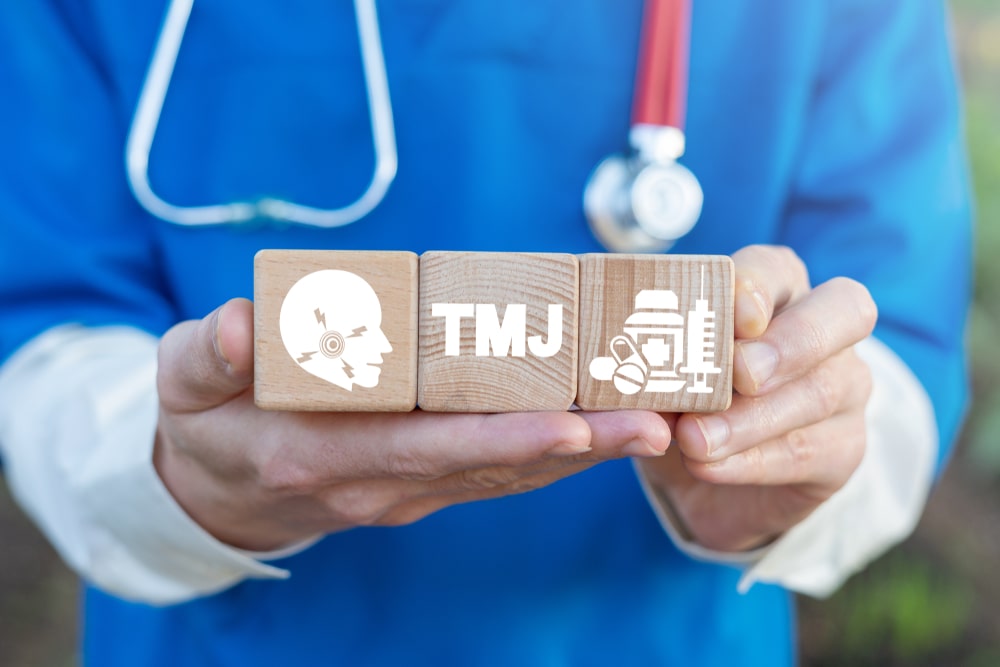The TMJ (temporomandibular joint) is located at the back of the jaw and connects the jawbone to your skull. It’s a ball and socket hinge that allows smooth jaw function, including chewing and speaking. For most, the jaw can slip back and forth without any issues; however, those who suffer from TMJ disorders experience pain when moving the jaw. TMJ disorders can also lead to increased headaches, and shoulder and neck pain.
Over 30 million Americans suffer from temporomandibular joint (TMJ) disorder with symptoms ranging from mild to severe. For some, the discomfort is debilitating and makes it challenging to get through daily activities.
The impact of TMJD on facial nerves
The TMJ is located behind a major facial nerve that connects throughout the face, head, and neck. The jaw is made of a complex system of bones, joints, and muscles that work together harmoniously and when the TMJ is out of alignment, pain can spread throughout the mouth, cheeks, eyes, ears, forehead, tongue, teeth, and throat.
Some of the facial muscles, nerves, and joints that can be impacted by TMJ disorders include:
- The joint that connects the teeth to the jaws
- The muscles that move the jaw
- The muscle that tenses the eardrum
- The muscle that opens and closes the Eustachian tubes
- The lining of the sinuses
When we consider the number of times we move our mouths in a day when eating, talking, yawning, and breathing, we can appreciate how hard the TMJ works for daily function. Pain associated with TMJ disorders can be extremely disruptive to our everyday routine and quality of life.
Causes of TMJ disorders
Most cases of TMJ pain result from an injury to the jaw or face, tooth or jaw misalignment, or grinding or clenching of the teeth. Some people with chronic TMJ dislocation are predisposed to joint anatomy that makes the jaw more likely to slip out of place. While the exact cause of TMJ disorders is difficult to determine, some risk factors include:
- Types of arthritis, such as rheumatoid arthritis and osteoarthritis
- Long-term clenching or grinding of the teeth (bruxism)
- Certain diseases that may affect the TMJ
How is TMJ disorder treated?
The concern with untreated TMJ disorders is that it can lead to damaged nerves, tendons, muscles, and cartilage, as well as permanent dislocation. Most patients seeking treatment want to relieve the pain impacting their quality of life.
As neuromuscular dentists in Pittsburgh, we aim to diagnose TMJ disorders and recommend effective treatments to reduce further damage.
Safe and effective TMJ treatments in Pittsburgh can include:
- DTR Therapy – Using the latest technology, TMJ specialists can accurately identify where friction and stress are causing muscles to hyperfunction. DTR Therapy for TMJ disorders can relieve painful symptoms. Dr. Alexandra George is one of only a few doctors in the world who is certified to perform DTR therapy.
- Dental Treatments – Some dental treatments, such as orthotic appliances, crowns, and braces can help align the jaw and bone structure or restore the mouth to a more comfortable function.
- Medication – Including pain relievers, anti-inflammatories, and muscle relaxants which provide temporary relief but do not address the underlying cause.
- Therapies – Such as physical therapy, oral splints, mouth guards, or counselling.
- Other procedures – Including corticosteroid injections, arthrocentesis, TMJ arthroscopy, or open-joint surgery
Each TMJD case is different, and a treatment that works for one patient may not work for another. Call us at (724) 934-3422 for more information, or fill out our contact form, and we will get in touch with you as soon as possible.


